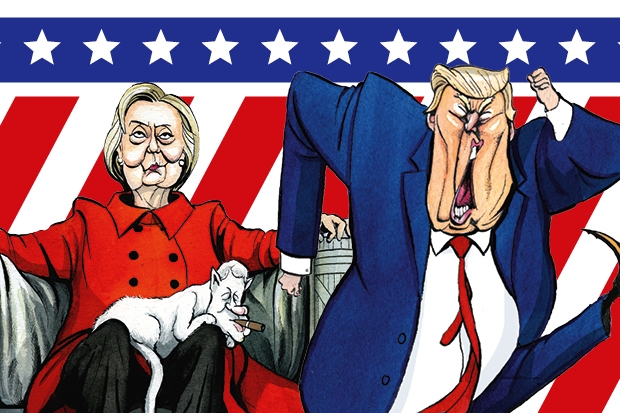What can you say about Donald Trump or Hillary Clinton that hasn’t been said a million times? The 2016 election has been more discussed than perhaps any other, and people are disturbingly well-informed, so bluffers might regard Tuesday night with apprehension. Never fear, though, America is still the land of opportunity as far as blagging is concerned, and American politics lends itself to BS like nothing else. So here, to get you started, are ten handy phrases for bluffing your way through election night
1. I’m sorry, but Trump isn’t Brexit and Brexit isn’t Trump. At some point in a conversation about Trumpism, somebody is bound to make the Brexit comparison, so raise the stakes. This remark shows you’ve heard it all before, and you’re not impressed. Be sure to hedge it: ‘I’m not saying there aren’t similarities …’, thus demonstrating an open but critical mind. You can then do the standard political bluffer’s riff on globalisation, those ‘left behind’, and the growth of anti-immigrant populism.
2. I’m actually more interested in the Senate/Congress battle tonight. When somebody starts talking about how Trump might actually win, respond with this line. It suggests you might already know the presidential result, when you don’t, and establishes you as somebody who was interested in American politics before the vulgar Donald show came along. Talk about how ‘New Hampshire’s senate race is a useful microcosm of American politics nationwide’ or how tight the ‘down-ballot fight’ in Missouri is.
3. Why aren’t more people talking about America’s opioid epidemic? Never mind that lots of people are talking about it, all the time, this line suggests you care — so sound passionate. You feel the pain of America. Talk about the plight of ‘non-college educated whites’, and look moved.
4. Trump could win the rustbelt but lose the sunbelt. Knowing your belts shows you know your American onions. Then discuss Trump’s appeal in the ‘former industrial heartlands’ among ‘blue-collar voters’ — try ‘Trump has actually co-opted the traditional, working class Democrat base’ if you want to show off — and mention his clear weakness with minority voters across the south.
5. Florida is make or break for Trump, obviously. The ‘obviously’ is key here — there is a strong chance that your audience will know this already. If they do, raise the bar by talking about ‘Florida’s crucial Jewish vote’ swinging it for Clinton, or how the ‘late surge in Latino turnout in the Sunshine state bodes well for her’.
6. I learned to stop trusting the exit polls after 2004. If your pals are getting excited about the likely victor after the exit poll, counter with this point. It suggests you remember when everybody thought John Kerry would be president, and that you know that history is full of surprises. If the exit polls show a very tight race, refer instead to the 2000 result and ‘hanging chads’.
7. Gary Johnson could lose it for Trump in states like North Carolina and Michigan. Well, he could, and this comment suggests you’ve been studying the polls. All you have to know about the Libertarian candidate is that, and his ‘Aleppo moment’.
8. But what about those suburban mothers in Pennsylvania? If somebody else is talking about Trump’s coalition, drop this gem. Use in the context of ‘Hillary Clinton’s firewall’, ‘soccer moms’, and ‘college-educated whites’.
9. Could there be a shy Clinton vote? Let others blather on about how the polls might be missing huge numbers of Trump voters, then floor them with this question. It is pretty much unanswerable.
10. Trump will lose, but Trumpism is here to stay. Look disturbed. The rise of the angries worries you because you are a sensitive soul. And in the unlikely event that you are proved wrong about the first part, at least you have recognised the root cause of Trump’s victory. Talk about ‘emergence of white nationalism’ and ‘the authoritarian tendency in late democracy’ and gesticulate like an aspiring dictator.
 After the American people have voted, what next for the US and the rest of the world? Join panellists including Sir Christopher Meyer, KCMG, former British ambassador to the US, for a discussion chaired by Andrew Neil on 30 November at RIBA, London. Tickets include a drinks reception. In association with Seven Investment Management. Book now.
After the American people have voted, what next for the US and the rest of the world? Join panellists including Sir Christopher Meyer, KCMG, former British ambassador to the US, for a discussion chaired by Andrew Neil on 30 November at RIBA, London. Tickets include a drinks reception. In association with Seven Investment Management. Book now.








Comments